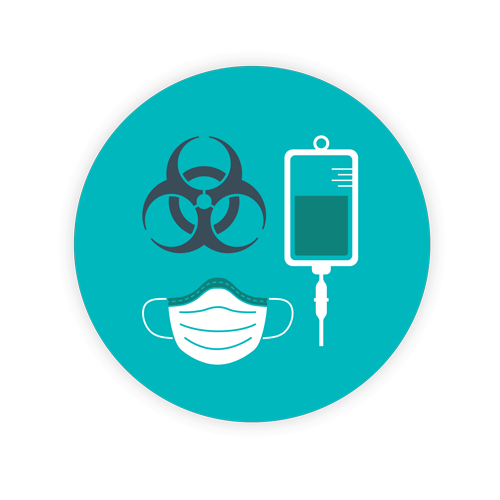Guide to Georgia Medical Waste Regulations

Do you work in any position within a healthcare facility in the great state of Georgia? Whether you work in a veterinary office, a dialysis center, or a hospital—this blog is relevant to you.
Are you aware of Georgia’s medical waste regulations? Whether you’re a new employee or a CEO, the state of Georgia expects you to know the rules and regulations regarding different types of medical waste.
Wait, how many types of medical waste are there? Consider the following:
- anatomical waste
- biohazard waste
- chemotherapy waste
- infectious waste
- microbiological waste
- pathological waste
- surgical waste
Do you know what the state of Georgia requires in regard to the collection, storage, transportation and disposal of each type of the above medical waste streams? Do you follow federal and state-mandated regulations when it comes to waste audit procedures and sharps container placement?
If you’re unsure how to answer any of the questions above, you may be putting yourself and your facility at risk not only for injury or potential needlestick injury, but also penalties (sometimes mounting to hundreds of thousands of dollars) for noncompliance.
Every medical provider, whether you deal with animals or humans, is required to follow federal guidelines when it comes to healthcare waste management. In addition to federal guidelines, every state specifies their own regulations, often more detailed than those of the federal government. Different states have different guidelines in regard to medical waste disposal and hazardous waste disposal. What does that mean for you?
Start reading and researching. Find out where you stand with Georgia’s medical waste regulations.
Where do I find the regulations?
In some states, it’s easier to find specific medical waste regulations than in others. Georgia’s medical waste regulations are not as easy to find and review as other states, but that doesn’t mean they don’t exist. They do and Daniels Health is familiar with them. In addition to federal guidelines, the primary source for Georgia’s medical waste regulations can be found within the Georgia Department of Natural Resources and their Environmental Protection Division (EPD).
When it comes to information regarding hazardous waste, you may have to look in several different places for information. For example, Georgia’s Environmental Protection Division sends regulation-seekers to other numerous documents and resources such as:![]()
- EPA’s guidance in regard to hazardous waste – under this section, you’ll find information regarding specific waste regulations, hazardous waste program areas, and what’s called the “cradle to grave system” involving hazardous waste management, transportation, recycling, treatment, and disposal.
- A hazardous waste management guide for Georgia hospitals (September 2003), covering basic guidance for the rules of Georgia’s hazardous waste management, which in turn follows the federal Resource Conservation and Recovery Act (RCRA) regulations.
At times, these regulations can be a bit convoluted. For example, the previously mentioned Hazardous Waste Management Guide for Georgia hospitals refers to the handling of hospital wastes that meet the definition of biomedical waste, found under George’s Solid Waste Management Rules (chapter 391-3-4). The state of Georgia defines biomedical waste as any solid waste that contains pathological or biological waste. This is fairly broad and also includes cultures, discarded medical equipment, or stocks of infectious agents or other “associated” biologicals.
These guidelines provide a link to yet another Georgia set of guidelines from the EPD. However, despite some ambiguity, hazardous waste generators from hospitals must:
- Assess each and every waste stream to determine if that waste stream is hazardous waste;
- Identify all waste streams generated by the hospital;
- Assess the amount/volume of hazardous waste generated by the hospital every calendar month; and
- Comply with all requirements regarding on-site hazardous waste storage as well as off-site shipment of hazardous waste. Needless to say, proper documentation is also required.
In addition to the above regulations, a number of other resources are available, including documents found within Georgia’s EPD such as a general fact sheet, guidelines for generators, guidelines for transporters, and a number of existing rules and laws as well as proposed rules. Again, a number of resources are found on the EPD website such as environmental rules and corresponding authorization statutes/laws.
As an example, Georgia regulations rule 391-3-12 (hazardous waste management) is also accompanied by authorizing statutes such as official code of Georgia – annotated O.C.G.A. §12-8-22 (Title 12. Conservation and natural resources. Chapter 8. Waste management. Article 2. Solid waste management. Part one. General provisions.)
To make things more complicated (as if it wasn’t already enough), found beneath a simple paragraph found under the Georgia code, you’ll also find the federal code (40 CFR Part 261, involving the identification and listing of hazardous waste and other parameters of hazardous waste, nonhazardous waste and hazardous medical waste as regulated under Part One of Article 3 in the Georgia Hazardous Waste Management Act – and violations thereof. You might want to check out some of the fines defined here for non-compliance. Eye-opening and wallet-cringing.
If you are feeling confused, which I know I am, have no worries. Daniels Health has been the authority on healthcare waste management for over 30 years—we’ve got you.
Don’t forget about federal regulations
In addition to state guidelines, you have to follow various federal regulations defined by the EPA for hazardous waste identification, classification, generation, management, and disposal. Such as:
- Part 261 ( Hazardous Waste Management System – General)
- Part 261 (Identification and Listing of Hazardous Waste)
- Part 262 (Standards Applicable to Generators of Hazardous Waste)
- Part 263 (Standards Applicable to Transporters of Hazardous Waste)
The list goes on. Any medical waste generator must also follow requirements and gain permits for numerous types of medical waste in addition to hazardous waste.
Want more? Under federal guidelines (Part 262 – Standards applicable to generators of hazardous waste), a number of subparts and subsections must also be followed. Do you have time to wade through all of them? We do. Daniels Health is familiar with and can help you adhere to regulations and state guidelines for numerous waste streams. That includes requirements, scope, and applicability of federal and state guidelines for different types of waste.
Do you know how to differentiate between biohazardous waste and chemotherapy waste? We do. Are you aware of the regulations when it comes to transporting any type of medical waste from your facility to medical waste companies in your area? We are. Do you realize that you’re the one (as a generator) ultimately responsible for how that medical waste is disposed of?
You need to not only be able to identify different waste streams, but aspects of medical waste removal and medical waste disposal. Not all medical waste companies are created equal. The same applies to medical sharps disposal companies or pharmaceutical waste disposal.
The devil is in the details when it comes to medical waste management. We don’t want the devil of the details to go down to Georgia and you end up with a fine for noncompliance.
The Daniels Difference
Daniels Health provides healthcare waste solutions such as sustainable and safe sharps disposal, device recovery, waste optimization and more. Do you know what to do with your laboratory waste? Daniels Health provides decades of experience in waste management, streamlining waste services, and ensuring proper disposal of all waste types generated from health facilities. That means sharps waste, and medical, hazardous, and pharmaceutical waste. We’re dedicated to increasing sustainability, reducing the volume of waste going to landfills, and promoting the use of federal and state approved reusable containers that reduce the risk of sharps injury.
Georgia’s medical waste regulations are convoluted. Let us help you untangle them to ensure compliance. If you would like further help navigating Georgia’s medical waste regulations, call one of our clinical experts today! Alternatively find out more about our Georgia operations and service capabilities on our Georgia service page here.
Let's Talk!
Your time is valuable, and we don’t want to play hard to get. You can either phone us directly on the details listed on our contact page, or feel free to fill out this short form and one of our team members will get back to you as quickly as possible.
